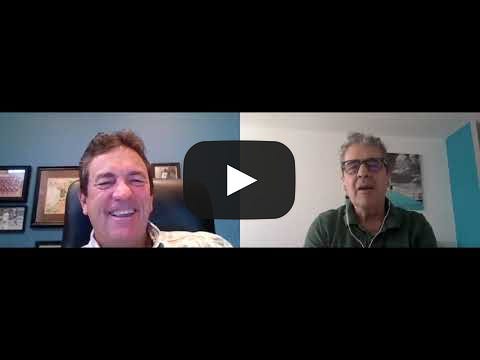You’re reading the My News Biz newsletter, which I will be sending you every other Thursday. My goal is to help you and other digital media entrepreneurs to find a viable business model that works for you. If you were forwarded this email, you can sign up here. How to get your book published, Part 2Meet agents at their public events, be persistent, and don't quit your day jobThis is the second of two guest posts by my friend and former journalism colleague Robin Yocum. He has published eight novels and two works of non-fiction. Here is a list of his books available on Goodreads.— JB By Robin YocumGetting published has more to do with hard work than with some kind of magical inspiration. Allow me to reiterate this one point: Keep grinding. Being a good writer is not the only skill needed. There are a lot of good writers out there, but only a few have the discipline to complete a manuscript and then take the battering of rejections that are bound to follow. The 500 words. When I’m working on a book, I try to do a minimum of 500 words a day. Sometimes, they’re awful words. Remember, Michael Jordan didn’t score 40 points every game. There are days when you’re in the zone and there are days when you struggle to find the right words. With that said, I’ll still do a minimum of 500 words. I was teaching a class and explaining the importance of grinding it out when a young student said, “That’s not the way the creative process is supposed to work.” I politely – okay, maybe not real politely – explained to her that the inspirational word fairy doesn’t sprinkle magic dust on my shoulder every morning. Sometimes, he or she, whatever the case may be, skips over my house. I still have a deadline and a book to finish. So I grind away. I can edit 500 bad words tomorrow. I can’t edit a blank sheet of paper. If I’m struggling in one chapter, I’ll write out a sequence. I will go and work on a different chapter that perhaps I’m a little more excited about and that will get the juices flowing. It doesn’t matter if I write out of sequence. I can put it all together like a puzzle later, if necessary. The goal is to make sure I move the ball 500 words down the field by the end of the day. (Pardon the football analogy; I played college ball at Bowling Green.) Agents like to say “no”Find an agent. It’s a difficult task. And again, you’re most likely going to hear the word “no” a lot. Before my agent went off on her own, she worked for a small agency that received 200 unsolicited manuscripts a month. The office assistant went through these, giving each a cursory glance. The ones that piqued her interest were passed on to an agent. The rest went into the recycling bin. So hit them with your best sentence right out of the blocks. Eventually, it will happen. Once you find an agent, things get easier, because it allows you to concentrate on writing while the agent handles sending out your manuscript and negotiating on your behalf. My agent does all the heavy lifting that I don’t want to do and all the math that I’m genetically incapable of doing. She’s been a warrior on my behalf. Caution: If an agent asks for up-front money, run like your hair’s on fire. Reputable agents take 15 percent only when the book is sold. Pro tip: attend writers’ eventsKnowing what I know now, if I was again looking for an agent, I would attend writers’ conferences where agents are on hand to meet with aspiring authors. This enables you to separate yourself from the crowd. If your manuscript needs work, but the agent can feel your passion and sees the potential, you’re likely to end up working with someone. Remember, an agent is not there because they want to be charitable. They are looking to take on people who can make them money. If they see the possibility that you could be a big earner, you’re going to get a read. It’s all about the benjamins. Don’t get discouraged. Sometimes, when an agent says that your manuscript doesn’t meet their current needs, that’s exactly what they mean. It doesn’t mean that you’re a terrible writer. It’s a fickle business, so don’t take “no” personally. That’s difficult to do when you’re talking about something that you’ve created, worked hard on and believe in. Three novels rejectedI wrote four complete novels before I got the first one published. Then editors were suddenly interested in the old manuscripts. They had been sitting on the shelf in my office for years. One of those was “A Brilliant Death,” which ended up being a finalist for the Edgar Award from the Mystery Writers of America. This was the same novel that was routinely turned down before I became published. Funny how that works, huh? Being a good writer isn’t necessarily all that’s needed. You have to have the fortitude to keep grinding when others are telling you to give up. A lot of times, getting published comes down to the writer deciding how bad they want it. I knew a magazine writer who told me he wanted to write a book about teaching hunting skills to millennials. This was not my cup of tea, but when he was telling me about it, I found it hysterical. He was a really funny guy. Two weeks later, he announced that he was quitting his job to go home and concentrate on his book. Don’t Quit Your Day Job!I told him this was a bad idea, but he insisted that it was the only way he could write and finish the book. He got up to 13,000 words and threw in the towel. He said it was terrible. I asked him to send it to me. He was right. It was terrible. It read like a training manual. When he told me about the book he wanted to write, it was engaging and funny. However, he had been unable to transfer his persona onto the page. He got his old job back, and I encouraged him to take another run at the book, but he gave up. Why? Because it wasn’t easy. He got discouraged and quit, instead of becoming more determined. I know another guy who tried to write a novel while in the Navy. When he finished, he reread his manuscript, then rolled it up, bound it with a rubber band, and dropped the manuscript and typewriter over the side of the ship. At that point, he settled into being a newspaper reporter. Hone your skillWork at your craft. Writing is like everything else in life. Louis Armstrong didn’t pick up a trumpet one day and magically become a world-famous trumpet player. Jordan had natural skills on the basketball court, but he worked hard to hone them. Writing is no different. It’s a skill that can be honed and improved. I’ve got a couple early manuscripts somewhere in the basement, and if I ever find them, I’m going to burn them. That’s how bad they are. But now that I’m on the other side of the fence, I’m rarely asked how many times I failed. The truth is, I could paper walls with rejection letters. No one cares or remembers how many times Babe Ruth struck out. All they remember is The Great Bambino. Hang in there. +++ My next novel: “The Last Hitman,” from Crooked Lane Books, is now available for preorder. The tentative release date is Dec. 2, but that could be moved up. I’m providing a link to my website where you can read the synopsis of “The Last Hitman.” www.robinyocum.net/novels
 +++ Coming next week: How to Get Your Book Published, Part 3. A lawyer went from writing True Crime to writing a novel. The novel was much harder. +++
+++ You're currently a free subscriber to Your News Biz. For the full experience, upgrade your subscription. |
EL PERIÓDICO DE LOS PERIÓDICOS. SOMOS NOTICIAS. Para publicar, contactar: aliazon.comercialyventas@gmail.com
Páginas
- Inicio
- NACIONAL ESPAÑA
- INTERNACIONAL
- BOLETINES DIARIOS
- PORTADAS
- SOCIEDAD
- POLÍTICA
- SECCIONES
- ARTÍCULOS
- ECONOMÍA
- CULTURA
- NOTICIAS TURISMO
- PERIODISTAS
- REVISTAS
- NOTICIERO
- HEMEROTECAS
- REDES SOCIALES
- EVENTOS
- CLIMA
- PUBLICIDAD
- MENÚ
- COMUNICADOS DE PRENSA
- BOLETINES INFORMATIVOS
- MUNDO RURAL
- FEMINISMO
- GASTRONOMÍA
- EMPRESAS
- EL TIEMPO
- RADIO Y TELEVISIÓN
- CIENCIA
- MOTOR
- CONSUMO
- EDUCACIÓN
- TOROS
- OPINIÓN
- BLOGS
- ELECCIONES
- PODCASTS
- PASATIEMPOS
- NEWSLETTERS
- EMPLEO
- SERVICIOS
- SALUD
- ARTE
- BELLEZA
- LIBROS
- NEGOCIOS
- MEDIO AMBIENTE
- TECNOLOGÍA
- LOTERÍAS Y JUEGOS
- MODA
- OTROS
- HORÓSCOPO
- LIFESTYLE
jueves, 27 de marzo de 2025
How to get your book published, Part 2
Suscribirse a:
Enviar comentarios (Atom)
ARTÍCULOS
¿Tienes información sobre alguna noticia interesante? aliazon.comercialyventas@gmail.com
ROPA Y COMPLEMENTOS ALIAZON
ROPA Y COMPLEMENTOS
OPINIÓN

Opinión y análisis // Diariocrítico.com
Artículos de Opinión | El Independiente
RSS de noticias de opinion
OPINION EL CONFIDENCIAL
Estrella Digital :: Últimas opiniones
Nuevatribuna :: Últimas opiniones
OPINIÓN-KHAMENEI
ÚLTIMAS NOTICIAS

ÚLTIMAS NOTICIAS
Últimas noticias // Diariocrítico.com
Estrella Digital :: Últimas noticias
Comentarios en: Últimas noticias
RSS de noticias de ultima-hora
PORTADAS
RSS de noticias de portada
NACIONAL ESPAÑA

Noticias nacionales | Diariocritico // Diariocrítico.com
MUNDO-KHAMENEI
CULTURA
ARTE
Arte y Cultura // Diariocrítico.com
TEATRO
Salud y vida saludable // Diariocrítico.com
SEXUALIDAD
Sexualidad y salud sexual y para disfrutar de las relaciones en pareja // Diariocrítico.com
SALUD
HISTORIA
Canal Historia // Diariocrítico.com
TURISMO
SOCIEDAD

Sociedad EL CONFIDENCIAL
LIFESTYLE
Estilo Hombre
MODA
CRÓNICA ROSA
Noticias del Corazón // Diariocrítico.com
LO MÁS LEÍDO
Lo más leido de la semana // Diariocrítico.com
CIENCIA
LIBROS
Noticias de libros, editoriales, autores y premios literarios // Diariocrítico.com
ECONOMÍA

Economía-EL CONFIDENCIAL
La actualidad económica en vivo - France 24
RSS de noticias de economia
COMENTARIOS DE ECONOMÍA
Comentarios de la Economía // Diariocrítico.com
Noticias economicas | Diariocritico // Diariocrítico.com
MERCADOS

Mercados - EL CONFIDENCIAL
EMPRESAS

Empresas - EL CONFIDENCIAL
FINANZAS






No hay comentarios:
Publicar un comentario